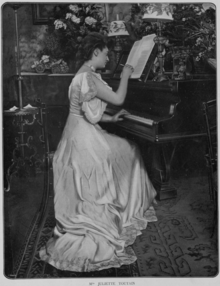Juliette Toutain
Juliette Toutain | |
|---|---|
 Juliette Toutain, from a 1903 photograph | |
| Born | July 22, 1877 Trouville-sur-Mer |
| Died | 1948 |
| Other names | Juliette Toutain-Grün |
| Occupation(s) | Pianist, organist, composer |
| Notable work | "Les Menottes" (1908) |
| Spouse | Jules-Alexandre Grün |
Marie Juliette Toutain (July 22, 1877 – 1948) was a French pianist, organist, and composer.
Early life and education
[edit]Toutain was born in Trouville-sur-Mer in Normandy, the daughter of Jules Toutain and Théodorine Poret. Her father was a naval administrator; her mother was a piano builder who knew many musicians in Paris. She trained at the Conservatoire de Paris,[1] where she studied composition with Gabriel Fauré and Auguste Chapuis, and was a prize-winning piano student of Raoul Pugno and Paul Vidal, and a top organ student of Alexandre Guilmant.[2] She completed her studies at the Conservatoire in 1902.[3] That year an American publication reported that "to a sufficient technic this young lady adds a charm and individuality of her own," adding that she was "the cause of a great deal of discussion at present. Although quite young, she has gained at the Conservatoire the first prizes for piano, organ, accompaniment, and harmony."[4]
Career
[edit]Despite her impressive training and international reputation,[5] Toutain faced significant barriers on the basis of gender.[6] Her family disapproved, and major competitions, such as the Prix de Rome, either did not accept women entrants, or made no practical arrangements for their attendance.[3][7] Her efforts to participate, while unsuccessful, opened doors for other women's participation.[8][9][10]
After her marriage in 1904, Toutain-Grün performed in concerts and wrote musical settings for poems by Albert Samain, Robert de la Villehervé, and Amédée-Louis Hettich to music, and wrote ten piano pieces called "Les Menottes" ("The Handcuffs", 1908). She composed a cantata on the beatification of Joan of Arc, which was performed at the dedication of a statue in Trouville in 1910.[6]
Toutain was organist at the Notre-Dame-de-Bon-Secours church in Trouville. Louis Vierne's Suite Bourguignonne for piano (1899) was dedicated to her.[1]
Personal life
[edit]Toutain married artist Jules-Alexandre Grün in 1904.[11] They had a son, Jean. Her husband died from Parkinson's disease in 1938, and she died in 1948.[12]
References
[edit]- ^ a b Smith, Rollin; Vierne, Louis (1999). Louis Vierne: Organist of Notre-Dame Cathedral. Pendragon Press. pp. 186, 187. ISBN 978-1-57647-004-6.
- ^ Leupold, Wayne (1999-12-22). The Organ Music of Alexandre Guilmant, Volume I: Pieces in Different Styles, 1st Series (Books 1-6). Alfred Music. pp. xix. ISBN 978-1-4574-5068-6.
- ^ a b Fauser, Annegret (2017-07-05). The Politics of Musical Identity: Selected Essays. Routledge. ISBN 978-1-351-54147-3.
- ^ "Paris". The Musical Courier. 44: 12. April 9, 1902.
- ^ "Notes from Paris". Truth. 51: 876. April 3, 1902.
- ^ a b "Juliette Toutain". www.musimem.com. Retrieved 2022-05-26.
- ^ Potter, Caroline (2016-04-29). Nadia and Lili Boulanger. Routledge. ISBN 978-1-317-09078-6.
- ^ Potter, Caroline (2017-07-05). French Music Since Berlioz. Routledge. p. 100. ISBN 978-1-351-56647-6.
- ^ Fauser, Annegret (1998-04-01). "La Guerre en dentelles: Women and the Prix de Rome in French Cultural Politics". Journal of the American Musicological Society. 51 (1): 83–129. doi:10.2307/831898. ISSN 0003-0139. JSTOR 831898.
- ^ Clark, Linda L.; Clark, Linda Loeb (2008-04-17). Women and Achievement in Nineteenth-Century Europe. Cambridge University Press. p. 112. ISBN 978-0-521-65098-4.
- ^ "A Letter from Paris". Black & White. 27: 651. April 30, 1904.
- ^ "Category:Toutain, Juliette". IMSLP. Retrieved 2022-05-26.
